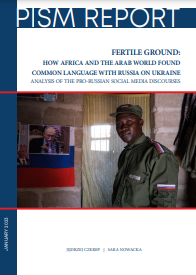Fertile Ground: How Africa and The Arab World Found Common Language With Russia on Ukraine Analysis of The Pro-Russian Social Media Discourses
Fertile Ground: How Africa and The Arab World Found Common Language With Russia on Ukraine Analysis of The Pro-Russian Social Media Discourses
Author(s): Jędrzej Czerep, Sara Nowacka
Contributor(s): Dorota Dołęgowska (Editor)
Subject(s): Politics, International relations/trade, Peace and Conflict Studies, Russian Aggression against Ukraine
Published by: PISM Polski Instytut Spraw Międzynarodowych
Keywords: Africa; Arab World; Russia; Ukraine; war; foreign policy; media;
Summary/Abstract: Since the start of the full-scale Russian war against Ukraine in February 2022, the governments of African and Arab states have shown restraint in criticising Russia. This is reflected in the voting on March 2, 2022, on the UN General Assembly resolution condemning the Russian aggression. Of the 35 abstentions, 17 came from Africa. Seven other countries from these group of states did not vote at all, and Eritrea and Syria openly supported Russia. Subsequent votes showed a similar pattern. The tradition of non-alignment, unwillingness to take sides in a war that was “not ours,” and calculations of the costs of losing Russia as a partner were important factors behind their choices, as were grassroots sentiments, which the governments must reckon with. In Africa and the Arab World, throughout different stages of the war, the public debate and the popular discourse around it, which to some extent is reflected in social media exchanges, showed substantial sympathy towards Russia. On a more grassroots level, the mainstream debate portrayed Russia’s incursion into Ukraine as justified, denying or relativising Russian terror, and saw Ukraine as a rogue actor guilty of the problems that spilled over to the rest of the world. While disinformation - intentional attempts by an actor (here: Russia-affiliated entities) to make one believe in false, but politically desirable elements of a story - played a part in shaping those sentiments, the pro-Russian discourse cannot be reduced to just that. While outspoken French/Beninese activist Kemi Seba might be justifiably listed by the U.S. State Department as Yevgeny Prigozhin’s (Russia’ info-war kingpin) principal agent of influence in Africa, he also seems to support Russia with true conviction. This can be explained by the formation of his earlier political and ideological positions within African and French socio-economic contexts and the imperative to satisfy his audience’s expectations. If agents of disinformation are seedsowers, introducing new talking points to the regions concerned, this analysis is focused on the fertile ground of locally relevant discourses and issues, without which the pro-Russian narratives would not have taken root and held. The authors explore the intellectual agency on the part of the debate’s mostly spontaneous participants, rather than seeing them solely as at the receiving end of processes steered from the outside. Pro-Russian views expressed in social media by the many citizens of African and Arab countries are quite often perceived in the West as part of the Russian disinformation and propaganda machinery. This is true only in part. Perceptions of Russia’s attractiveness, among African and Arab populations, as illusory as they might be, are often born out of their perceptions of the West. They have experienced its hypocrisy, self-interest, and untrustworthiness, which fuels resentment and pursuit of radical change. A social media user may see his/her transformation into adopting - at least declaratively - an “alternative” view on global events, as a satisfying act of rejecting the unwanted status quo, marred by local conflicts and economic and social hardships. This led the authors to conclude that the declared support to Russian policies and war are most often secondary to other bigger and locally more relevant stories and sets of problems. Those “super-narratives,” centred on issues of agency, domination, (un)fairness, and tradition help Arab and African audiences contextualise Russia (often incorrectly or based on misinformation) and frame it within a familiar area. They help to relate to the Russian story of the war in Ukraine on the basis of local experience and conditions. Members of the Pan-Africanist Facebook community who eagerly post comments glorifying Putin’s speeches and pronouncements on Ukraine do so primarily because they relate to his critique of colonialism and racism. At the same time, the 2003 invasion of Iraq or the Israeli-Palestinian conflict prompt Arab commentators to criticise the sanctions against Russia, since such measures were not implemented when Arab states’ sovereignty was violated. They do this, though, not because they gleefully agree with Putin’s conduct of the war or because they were manipulated into doing so. In this sense, pro-Russian narratives are often adopted organically, but they are also superficial. Understanding these mechanisms can help avoid basing Western policies and communication - meant to build cohesion around the Ukrainian cause - on false assumptions. Upholding the narrative that simplifies whatever is sympathetic to Russia as mere disinformation builds upon the same mindset that led to the citizens of these countries to be suspicious of narratives coming from the West. This includes the argument about non-Western regions as a “battleground of ideas” rather than space in which rational actors that may possess and propose ideas themselves. Continuing within this intellectual framework is not only counterproductive but further alienates non-Western actors. While countering disinformation is the right thing to do, it may not be sufficient to proceed the same way against legitimate resentment that increases the popularity of pro-Russian narratives.
Series: PISM Reports
- E-ISBN-13: 978-83-67487-12-2
- Page Count: 97
- Publication Year: 2023
- Language: English
- eBook-PDF
- Table of Content
- Introduction

